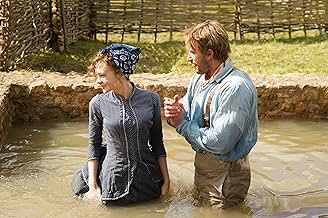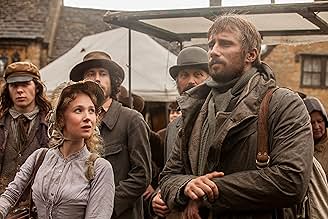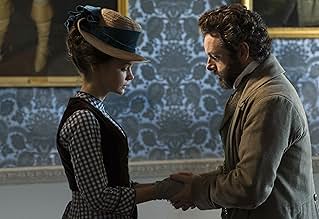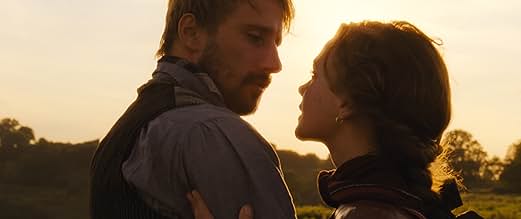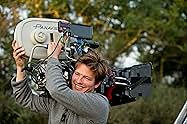Im viktorianischen England zieht die unabhängige und willensstarke Bathsheba Everdene drei sehr unterschiedliche Verehrer an: Gabriel Oak, einen Schäfer; Frank Troy, einen verwegenen Sergean... Alles lesenIm viktorianischen England zieht die unabhängige und willensstarke Bathsheba Everdene drei sehr unterschiedliche Verehrer an: Gabriel Oak, einen Schäfer; Frank Troy, einen verwegenen Sergeant; und William Boldwood, einen wohlhabenden und älteren Junggesellen.Im viktorianischen England zieht die unabhängige und willensstarke Bathsheba Everdene drei sehr unterschiedliche Verehrer an: Gabriel Oak, einen Schäfer; Frank Troy, einen verwegenen Sergeant; und William Boldwood, einen wohlhabenden und älteren Junggesellen.
- Regie
- Drehbuch
- Hauptbesetzung
- Auszeichnungen
- 2 Gewinne & 11 Nominierungen insgesamt
Empfohlene Bewertungen
Thomas Hardy would make a fortune today writing soap opera period pieces like Far from the Madding Crowd for HBO. That's a compliment because this film is done with such restraint (far fewer gratuitous country-beautiful shots and more close ups) that it could have been set in any era and the human condition would be the same.
Besides its fidelity to the spirit of Hardy's typically bright, tough farm girl ("I have an education. Nothing else"), class division, complicated loves, Far offers a heroine, Bathsheba (well-cast, crooked smiling Mulligan) far ahead of her time (See the above quote). Although she doesn't want for suitors, she doesn't want to be subjugated by a husband either ("being some man's property"). Katherine Hepburn could have played this role.
As life and Hardy would have it, chance and human nature have their own agendas, and Bathsheba makes bad decisions based on youthful passion and naiveté—Hardy, frequently a figurative scold, makes sure she pays amply for her mistakes before he sets the balance right between fortune and misfortune. His more famous Tess of the d'Urbervilles is the finest example of the strong-willed, suffering heroine, who, because of weak men, is mercilessly buffeted by the fates and her own weakness.
One of Bathsheba's suitors, the painfully shy William Boldwood (Michael Sheen), personifies the aging Victorian society, bound in property and loneliness; to her he importunes, "I want very much to protect you for the rest of your life." However, the temporary prize of Bathsheba is given to the crimson-uniformed rake, Sergeant Francis Troy (Tom Sturridge), another character waiting for Hardy's punishment.
The obvious right guy for her is farmer Gabriel Oak (Matthias Schoenaerts), whose steadfast love for the heroine could only be compared to Job's suffering. To her he always speaks honestly and lovingly: "I'm not going to tell stories just to please you. You can be sure of that."
Far from the Madding Crowd is a crowd pleaser. Hardy would have loved the adaptation.
Bathsheba is a magnet to men with her feisty and independent behaviour, and the film documents the "love square" between her and three men in her life: Gabriel Oak (Matthias Schoenaerts), the hunk of a farm manager; William Boldwood (Michael Sheen), the wealthy neighbouring landowner; and Sergeant Troy (Tom Sturridge), a dashing Han-Solo style rogue, flash-as-you-like in his scarlet army uniform.
In reviewing this film I need to declare a couple of loves.
Firstly, Dorset. Of all the English counties, this has to be one of the most glorious. Green rolling hills, dramatic coastline such as that at Golden Cap (featured in the film), quaint villages and – most importantly in this context – gorgeously photogenic. Hopefully, this might tempt more visitors to stop there rather than 'driving on through' to Devon and Cornwall for their holidays.
Secondly, and with apologies to the wife, Carey Mulligan. To be clear, this is not a sordid sexually-motivated affair (although there was THAT shower-scene in "Shame") but a deep love of her acting talents and screen presence. This is a love affair long in the making, beginning ten years ago with her startling presence in Bleak House at the age of 20 (looking much, much younger); her stunning minx-like Dr Who performance as Sally Sparrow in "Blink"; and on through her breakout movie performance in "An Education" in 2009.
Where Mulligan excels is in roles where she can play a strong, confident and independent woman, so the role of Bathsheba is perfect for her. She is utterly believable as the 1870's landowner holding her own against the men-folk, and even pulling off the somewhat out-of-character plot twist half-way through the film.
The supporting cast is also excellent. The ever-reliable Sheen ("The Queen"; "Frost/Nixon") delivers a heart-breaking performance as the love-lorn Boldwood; Schoenaerts (recently in "Suite Française") is manly enough with a scythe to no doubt set female hearts a flutter; and Sturridge is deliciously unpleasant in his powerful role.
Above all, this is just a crackingly good story, through David ("One Day") Nicholls's tight screenplay. If you decide to avoid this film because it is "old stuff", think again. The roller-coaster ride of the plot gives UK and US 'soaps' a good run for their money in the drama stakes, and the denouement is both surprising and satisfying.
Direction is by the relatively unknown (to me at least) Thomas Vinterberg ("The Hunt"), but big kudos needs to go to Vinterburg's collaborator Charlotte Bruus Christensen for the stunning cinematography: some of the scenes (notably the harvesting scene towards the end of the movie) are bucolically gorgeous.
Also worth noting is the soundtrack by the brilliant but sparingly used Craig Armstrong ("Love Actually", "The Great Gatsby") which is luscious and suits the film to a tee. The woodland rendezvous scene makes your hair stand on end and this is largely down to the music combined with Claire Simpson's excellent editing.
I struggle to find aspects to criticise. I was gripped, and suitably shocked at the right moments, which is just what you want for a good night out at the movies. Having already praised the cinematography, one gripe I would have is with the lens flare at the end of the film (natural this time, rather than of the JJ Abrams variety) which was annoyingly distracting to me in the closing scene: but I recognise this is a personal complaint that I might be alone in.
Just a word of warning as well for animal lovers: that despite it being a UK 12A certificate, there are some pretty torrid scenes with sheep and a dog that might upset sensitive viewers - perhaps it should have been given a "Ewe" certificate (that joke will only work for UK readers!).
In summary, this is a treat for a more elderly audience, but should be a must see for audiences of all ages as a rollicking good tale, well told and beautifully shot.
(If you enjoyed this review, please see the multi-media version at bob-the-movie-man.com and enter your email address to receive future reviews. Thanks.)
The final whitewashing of this script's plot is the moral omittance of her not speaking up for Boldwood. Rescued from a threatening situation it is her testimony that could save a life, but as before she walks away. This script has her succeeding, but the film leaves little sense of the destruction she left in her path.
I think the scene when Fanny got the wrong church was disappointing as well. There was no sense of the mad dash she had across town to find the right church and only to find Frank striding out full of indignation at being stood up and telling her "It's too late!" The beautiful words of Gabriel to Bathsheba "when I look up there ye will be and when you look up there I will be" just don't feature at all.
The "shooting at the end was tame to say the least & Martin Sheen was much less forceful in his insistence of marrying Bathsheba But I did like Carey Mulligan as Bathdheba. What was missing was the energy & drama the original film had and dare I say it some Wessex accents....
In a time ruled and defined exclusively by men, Bathsheba Everdene (Carey Mulligan) stands apart as a free-spirited, independent young lass who refuses to bow to convention. When she inherits the farm belonging to her late uncle, she insists on running it herself - working in the fields and sacking the male workers who disrespect her authority. Small wonder, then, that Bathsheba draws the attention of three suitors, each one representing a different social class and a unique brand of manhood: stoic farmer Gabriel Oak (Matthias Schoenaerts); stern, serious-minded landowner William Boldwood (Michael Sheen); and sexy, emotionally scarred sergeant Francis Troy (Tom Sturridge).
The main problem with Hardy's novel, which is largely replicated in Vinterberg's faithful adaptation, is its awkward attitude towards its lead female character. To be sure, Hardy gives Bathsheba a modern voice that still rings true today: "It is difficult for a woman to define her feelings in a language chiefly made by men to express theirs," she declares. It's a line so delicious that screenwriter David Nicholls nicked it wholesale for the film. And yet, on a deeper reading of the novel, it becomes far harder to tell whether Hardy is celebrating Bathsheba's independence, or punishing her for it.
To their credit, Vinterberg and Nicholls do try a little harder to add a truly feminist bent to their version of Bathsheba's story. More care is taken to forge a genuine emotional connection between Bathsheba and Gabriel, even as her seduction of William Boldwood is made less purposeful. Bathsheba still finds herself approaching Sergeant Troy with lust rather than caution, but she does so in a more clear-eyed manner. In effect, Mulligan's Bathsheba seems bemused at and somewhat resigned to the sillier decisions she makes in her romantic pursuits.
The trouble is that, while these little changes do add up to a stronger character, they also result in thematic and tonal confusion. The truth of the matter is that Hardy was not always concerned with celebrating Bathsheba as a character in her own right - he was frequently more interested in commenting on the ideal romantic suitor, the kind of man to whom Bathsheba should give her heart. There's never any doubt, in Hardy's mind at least, what her choice should be. After a point, then, Vinterberg's film flounders because there is, truthfully, no real tension in the romantic dilemma that stares Bathsheba in the face.
It's a shame, because Vinterberg has brought Hardy's world to life with a very good cast indeed. Mulligan plays the fire and spirit of Bathsheba well, although she's trapped as much by the script as her character is by Hardy's words and ideas in the novel. As the sturdy Gabriel Oak (his surname says it all), Schoenaerts turns a rather dull but handy lump of a man into a semi-credible romantic prospect. The ever-reliable Sheen doesn't have quite enough screen-time, but nevertheless packs a great deal of depth and despair into the loss of William Boldwood's heart (and, perhaps, mind) to the charms of Ms. Everdene. There's almost more to be enjoyed in the semi-confessional scene shared by these two very different men as they sheepishly dance around their feelings for the same woman. Sturridge, meanwhile, is the relatively weaker link in the cast; his performance is fuelled more by his sexy moustache and saucy swordmanship than anything else.
At a point in time when female-led films are being discussed, dissected and celebrated more than ever before, Far From The Madding Crowd would - at least on the surface - appear to be part of this growing tradition. The filmmakers have certainly tried to create a version of Bathsheba Everdene that's unequivocally appealing to a modern audience. But it's an effort that, ultimately, doesn't quite work, since the point of Hardy's novel was arguably more about the man Bathsheba should marry, and less about Bathsheba herself.
Wusstest du schon
- WissenswertesAsked who she would have chosen if she had these three very different suitors in real life, Carey Mulligan chuckled as she quickly replied, "I probably would have gone for the guy with the baby lamb (Gabriel) in the first 20 minutes of the film."
- PatzerIn the final scene when Gabriel leaves the farm he is wearing white trousers and white shirt with a dark waistcoat but shortly later when B catches up with him he is dressed in completely different clothes.
- Zitate
Bathsheba Everdene: It is difficult for a woman to define her feelings in a language chiefly made by men to express theirs.
Top-Auswahl
Details
- Erscheinungsdatum
- Herkunftsländer
- Offizieller Standort
- Sprache
- Auch bekannt als
- Lejos del mundanal ruido
- Drehorte
- Mapperton, Beaminster, Dorset, England, Vereinigtes Königreich(Bathsheba Everdene's farm)
- Produktionsfirmen
- Weitere beteiligte Unternehmen bei IMDbPro anzeigen
Box Office
- Budget
- 12.000.000 £ (geschätzt)
- Bruttoertrag in den USA und Kanada
- 12.236.500 $
- Eröffnungswochenende in den USA und in Kanada
- 164.985 $
- 3. Mai 2015
- Weltweiter Bruttoertrag
- 30.599.369 $
- Laufzeit1 Stunde 59 Minuten
- Farbe
- Sound-Mix
- Seitenverhältnis
- 2.35 : 1
Zu dieser Seite beitragen








